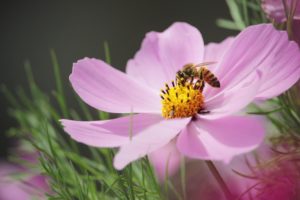
Many of our favorite dishes are drizzled with Americans’ #1 preferred sweetener – honey. Delicious and comforting, honey is the craftwork of our beloved honey bee. Behind the hive, there are a number of innovative thinkers from universities across the nation protecting the well-being of bees so that we can continue to have lush crops and food on the table.
Here are a few.
Five years ago, Michigan State University launched Heroes to Hives (H2H), a program that teaches veterans, active-duty personnel, National Guard members, and reservists how to become beekeepers. This unique cohort is important to the protection of honey bees and the production of honey because of their keen understanding of the need for national food security. Participants in this program can receive a beekeeping apprenticeship credential, as well as networking opportunities with key industry professionals.
A great example of understanding the connection between bees, a local ecosystem, and the food being grown comes from the Gratton Lab at the University of Wisconsin-Madison. The team there developed WiBee, a smartphone app that gives farmers data for better pollination management, including data on the kinds of bees on their land and how many are pollinating crops.
And most recently, the University of California, Riverside, received a $900,000 grant for bee researchers and engineers to explore bee breeding programs plus medicines and tools for bee health. California is one of the top five honey-producing states.
The beautiful and intricate relationship between bees, the land, and the food we eat – including Mother Nature’s sweetener – will continue to thrive when universities dedicate resources to innovative programs like these.
